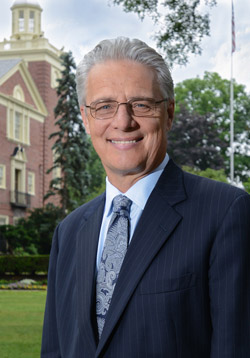
Download Image: Web
On Dec. 23, 2017, the Commonwealth of Pennsylvania announced a $2 million Redevelopment Assistance Capital Program (RACP) grant to support construction of the proposed Lycoming College Gateway Building. This award provides the Gateway Project with real momentum and represents a major step toward securing the needed funding. We are grateful to Lycoming graduate State Sen. Gene Yaw '70 for his strong advocacy that made this grant a reality.
The announcement of this RACP grant capped a year of remarkable success for the College in pursuing major grants from the federal and state government. Earlier in the year, the National Science Foundation (NSF), which is an agency of the federal government, funded two scholarship programs at Lycoming College with grants totaling $1,650,000. In addition, the U.S. Department of Justice (DOJ) approved a $300,000 proposal to support sexual assault prevention programming.
In May 2017, the College received the first of the two NSF grants. The five-year $1 million grant will fund Noyce scholarships to help recruit undergraduate majors in biology, chemistry, mathematics and physics and prepare them to become 7th-12th grade teachers in high-need school districts. It both builds on the historical strength of the College’s science departments and education program and responds to the critical need for highly effective K-12 STEM teachers in underserved schools. During the term of the grant, eighteen Lycoming students will be named Noyce Scholars and will receive tuition scholarships and summer research stipends. Rachel Hickoff-Cresko, Ed.D., assistant professor of education, and Charles Mahler, Ph.D., assistant professor of chemistry, will coordinate implementation of the program.
In late November 2017, the second NSF grant was received. This $650,000 S-STEM grant will allow the College to recruit and support 14-16 low-income, academically talented undergraduate students interested in pursuing degrees in astronomy, physics, biology, chemistry or mathematics. In addition, grant dollars will also fund strategies and practices that have been proven to promote retention and graduation. Key components of this enhanced support include a living-learning community that will house two cohorts of S-STEM scholars; a faculty mentorship program; upperclassmen, alumni and career advisers; and a program that will provide at least one guaranteed paid summer internship and/or research experience for each scholar. This grant becomes a strategic admissions initiative by enhancing the College’s ability to attract applications from and recruit talented science-oriented students from both rural and urban areas.
The third federal grant came from the DOJ. This $300,000 award will enable the College to implement a comprehensive program to prevent sexual assault, dating and domestic violence. The grant provides funding to hire an expert to design programs focused on bystander intervention and other evidence-based interventions.
In all, the College received almost $4 million in government grants during 2017. Achieving this level of success was accomplished by investing in consulting relationships and staff development. For federal grants, we partnered with McAlister & Quinn, and a number of faculty and staff also contributed to the effort. Delta Development provided us with the expertise needed to gain the RACP grant, and they are also our partners in identifying funding sources for other facets of the Gateway Project.
While the amount of grant dollars is impressive, it is not the most important feature of this work. What matters more is that the funding allows the College to advance its strategic interests. All four grants will strengthen our capacity to recruit talented students to the College. They will also enrich the learning experience of students who decide to enroll. They will be instrumental in building a Greater Lycoming.